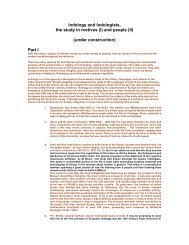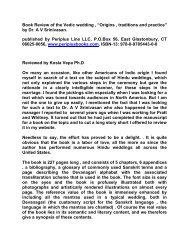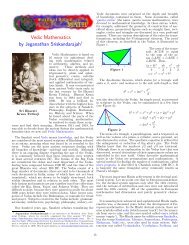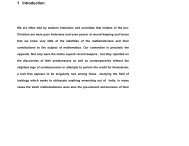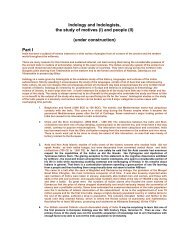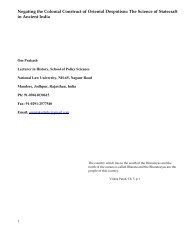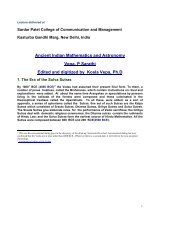The Dhaarmik Traditions - Indic Studies Foundation
The Dhaarmik Traditions - Indic Studies Foundation
The Dhaarmik Traditions - Indic Studies Foundation
You also want an ePaper? Increase the reach of your titles
YUMPU automatically turns print PDFs into web optimized ePapers that Google loves.
93 Nischitaaartham,<br />
िनिःचताथर्म<br />
strives for . <strong>The</strong> word does not mean heaven and is analogous to Moksha in the<br />
Sanaatana dharma<br />
Engagement ceremony prior to a wedding. Literally means ‘firming up’ of the<br />
relationship and is usually commemorated with a Puja and an exchange of rings, gifts<br />
and invitations to the wedding ceremony<br />
94<br />
95<br />
96 Pancha – sanskrit term for five e.g. Panchabana,panchatantra<br />
97 Paramparaपरंपरा tradition,as in likhita Parampara (written tradition), srauta Parampara (oral tradition),<br />
guru Parampara, (the guru-disciple tradition)<br />
98 Place Value<br />
System,◌ःतान<br />
99<br />
100<br />
Poornima,पूिनर्म<br />
Purana,पुराण<br />
101 Purusha,Paurush<br />
eya,Apaurusheya<br />
the most common sanskrit word for this is sthana which literally means place<br />
full moon<br />
literally means the ancients. Traditional sanskrit texts dealing with diverse topics such<br />
as the creation of the world ,legends, genealogy of sovereigns, In the <strong>Indic</strong> context,<br />
puranas have special significance both from a temporal stand point and from a<br />
historical perspective<br />
In Hinduism, Purusha ("Cosmic Man") is the "self" which pervades the universe. <strong>The</strong><br />
Vedic divinities are considered to be the human mind's interpretation of the many facets<br />
of Purusha. According to the Rigvedic Purusha sukta, Purusha was dismembered by the<br />
devas -- his mind is the moon, his eyes are the sun, and his breath is the wind.In<br />
Samkhya, a school of Hindu philosophy, Purusha is pure consciousness. It is thought to<br />
be our true identity, to be contrasted with Prakrti, or the material world, which contains<br />
all of our organs, senses, and intellectual faculties.Amore restrcted meaning of purusha<br />
is youth or human (paurusheya).Hinduism in that sense is an Apaurusheya belief system<br />
as opposed to the revealed or prophetic faiths such as Judaism,Christianity or Islam<br />
which would therefore come under the category of paurusheya religions<br />
102 PurushArtha PurushArtha or ManushyArtheha is the pursuit of the four kinds of human aspirations,<br />
which are dharma, artha, kAma and moksha. <strong>The</strong> four pursuits in which humans may<br />
legitimately engage, also called chaturvarga, "four-fold good" , is a basic principle of<br />
Hindu ethics.<br />
103 PramAnam,<br />
ूमाणम<br />
the process of gaining knowledge, sometimes used to express the goal as well as the<br />
means to attain knowledge, as in Apaurusheya PramAnam<br />
104 Prasthanatrayi Prasthanatrayi, literally, three points of departure, (IAST Prasthānatrayī) refers to the<br />
three canonical texts of Hindu philosophy, especially the Vedanta schools. It consists of:<br />
the anishads, known as Upadesha prasthana (injunctive texts),the Brahma Sutras,



